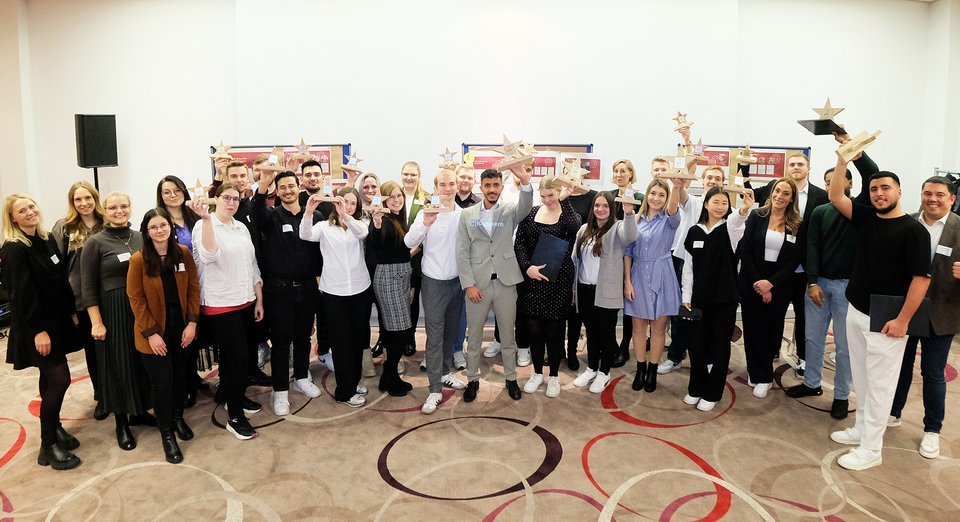
From shopping trolleys to greenhouses or household rubbish to trendy bags: The winning teams of the eleventh edition of the REWE Group Star competition for young talent were true quick-change artists in terms of Sustainability.
In Cologne, the number 11 is a special feature and is known as the "Jeckenzahl" (carnival number), among other things. However, the number 11 is not only symbolic for the Rhineland metropolis, but this year also for the REWE Group Star. The Group-wide competition for young talent on the topic of Sustainability was organised for the 11th time. 28 teams of trainees and other junior staff entered with creative ideas, and six winning teams have now been awarded the REWE Group Star in Düsseldorf. Franziska Halstrick, Head of Human Resources Development, moderated the ceremony at the Leonardo Royal Hotel and explained the concept: "The REWE Group Star combines topics relating to inclusion, climate protection and sustainability."
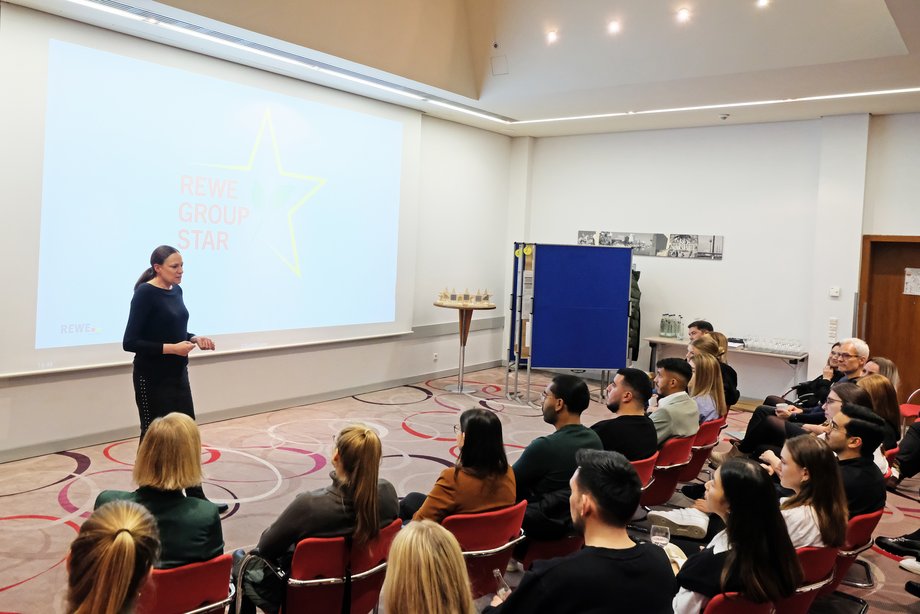 Daniela Büchel presented the prizes to the winning teams.
Dr Daniela Büchel, the REWE Group Management Board member responsible for Sustainability and People, presented the prizes to the winning teams: "It is very special for me to see so much commitment combined in one place." She praised the trainees as "ambassadors for sustainability and social issues who encourage other people to get involved too."
Daniela Büchel presented the prizes to the winning teams.
Dr Daniela Büchel, the REWE Group Management Board member responsible for Sustainability and People, presented the prizes to the winning teams: "It is very special for me to see so much commitment combined in one place." She praised the trainees as "ambassadors for sustainability and social issues who encourage other people to get involved too."
In her welcoming address, she also explained the importance of the topic: "Sustainability is an absolutely important issue for REWE Group, because it thrives on participation, on people who support the topic and on the commitment of the participants, who carry sustainability in their hearts. When we stand up for an issue like this together, it brings us together as a company." The Management Board member hinted that this will certainly not be the last REWE Group Star and that good ideas are still needed: "Experience shows that Sustainability is a marathon and you have to find solutions for it."
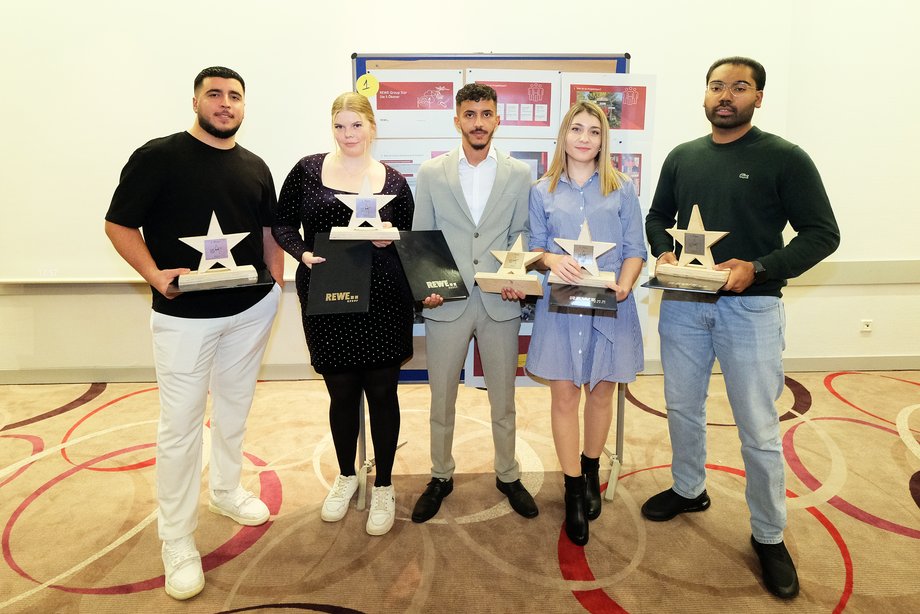 1. Place: "The 5 economists"
1. Place: "The 5 economists"
Team: Arashdeep Singh, Ouassim Fourka, Alina Delventhal, Marina Gordilla, Ceyhan Tugrul
Area/SGE: REWE Region Centre
What was the main idea behind the project?
"Our aim was for children to understand at a young age how to grow their own fruit and vegetables," explained Fourka, a retail trainee at the REWE store in Eschborn. The idea of transforming a REWE shopping trolley box with several shopping trolleys into a greenhouse enabled the "5 Ökoner" to secure first place in the REWE Group Star competition.
What was the most important aspect of the project for you?
"Our aim was to promote regional cultivation, raise awareness of healthy eating at an early childhood education age and use and utilise existing resources through upcycling," Ceyhan Tugrul continues.
In collaboration with the "Hexenkessel" daycare centre, herbs were planted with the children and the daycare centre has already been supplied with seeds for the next planting season so that fruit and vegetables can be grown.
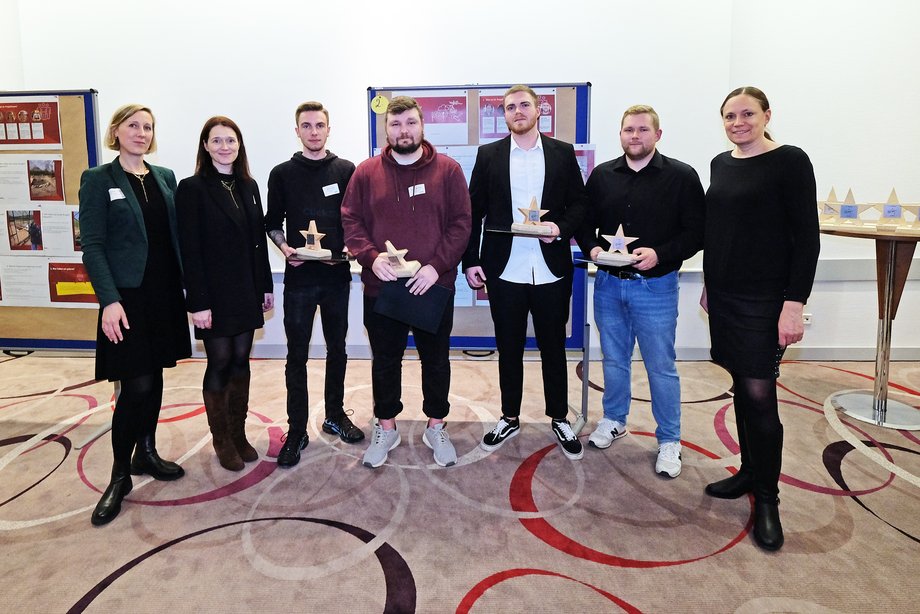 2. 1st place: "The Summsumms"
2. 1st place: "The Summsumms"
Team: Nils Rosenberger, Dennis Mertineit, Julian Gysau, Niclas Peters, Walther Reinboth
Area/SGE: REWE Region East
What was the main idea of the project?
The project focused on organising four different workshops for children with the aim of building insect hotels to counteract insect mortality. In addition, the group was not only able to provide the animals with a new home by building the insect hotels, but also to improve the appearance of the gardens of the workshop participants - an after-school care centre and a military base. In addition, special creativity was required in some cases, as EU funding was applied for and co-operation partners were brought on board to keep the costs for the participants as low as possible.
What was the most important aspect of the project for you?
Raising awareness of this particular topic was particularly important to the group: "We wanted to focus the broad topic of Sustainability on species protection and insect conservation and came up with the idea of offering workshops on building insect hotels," recalled Nils Rosenberger, recalling how the idea came about.
The result: a total of 104 insect hotels were built to familiarise children in particular with the concept of species conservation.
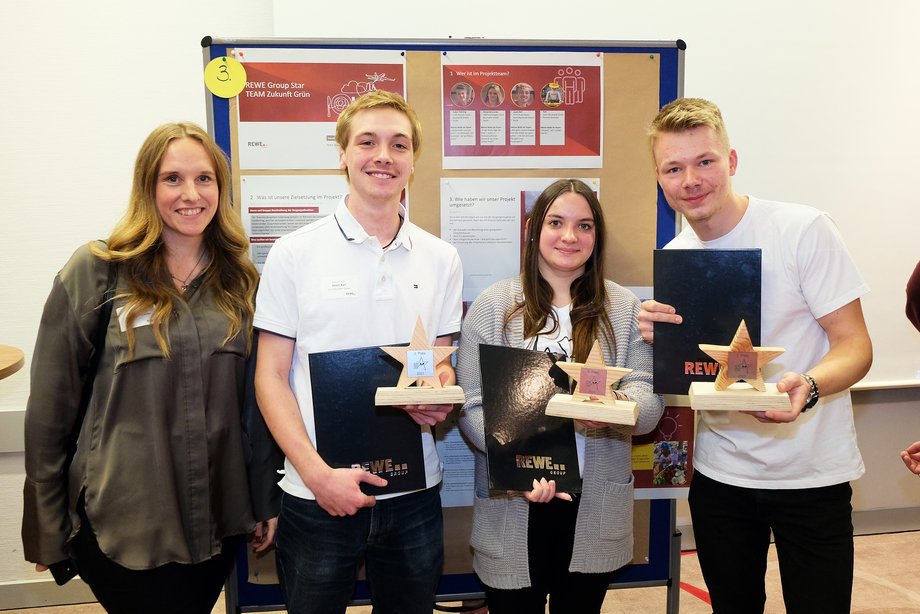 3. Place: "Future Green"
3. Place: "Future Green"
Team: Jaden Röling, Jason Keil, Alexandra Linke
Area: toom Baumarkt DIY store in Duderstadt
What was the main idea behind the project?
The main idea was based on the special initial situation: The "Falkenweg" nature kindergarten won a sum of money in the environmental lottery, which was to be invested in a concept-orientated manner. Based on the existing cooperation with toom, the contact was already there and the group was therefore the first point of contact. The "Falkenweg" nature kindergarten aims to teach children responsibility for life and the environment, but until now they have only been able to grow their own food in makeshift greenhouses. The group took this as an opportunity to set up a professional greenhouse for the kindergarten, enabling them to grow fruit and vegetables all year round. "It's great to see that the children now have the opportunity to grow plants all year round, harvest them themselves and not only get closer to nature, but are also directly involved in climate protection as our successors," reported Jaden Röhling.
What was the most important thing about the project for you?
"It was important for us to teach children how a green and sustainable environment works," added team colleague Jason Keil. Ultimately, it was also about building and strengthening the children's appreciation of nature.
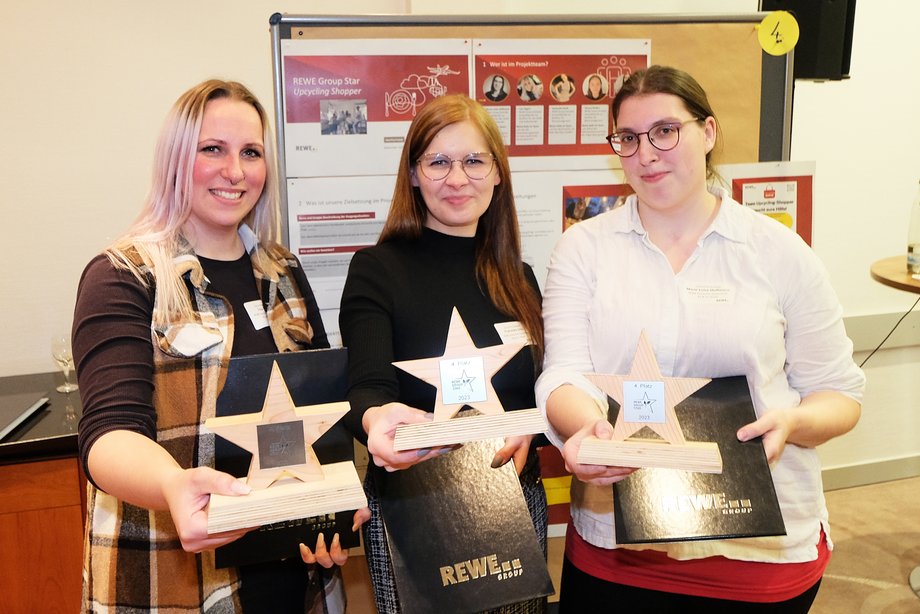 4. 1st place: "Upcycling Shopper"
4. 1st place: "Upcycling Shopper"
Team: Samantha Konk, Gianna Rießen, Marie-Luise Hoffmann, Lisa Vogels, Franziska John
Division/SGE: REWE Deutscher Supermarkt AG & co. KGaA
What was the main idea behind the project?
"Through our project, we want to draw attention to the reduction of household waste by reusing avoidable waste and making something new out of it," said Lisa Vogels, wholesale and foreign trade apprentice at REWE Group.
The group created trendy shopping bags from old 1-litre drinks cartons, which are then sold. The proceeds go to "LeseWelten", an initiative of the Cologne Volunteer Agency. "We also find the project very creative because we have turned supposed waste into something totally cool and new. We also learnt that even small things can change the world," added Franziska John, who currently works as an office management trainee at PENNY.
What was the most important thing about the project for you?
On the one hand, the focus was on reusing resources that were actually unusable and, on the other, not losing sight of the social aspect and donating the proceeds to a charitable organisation.
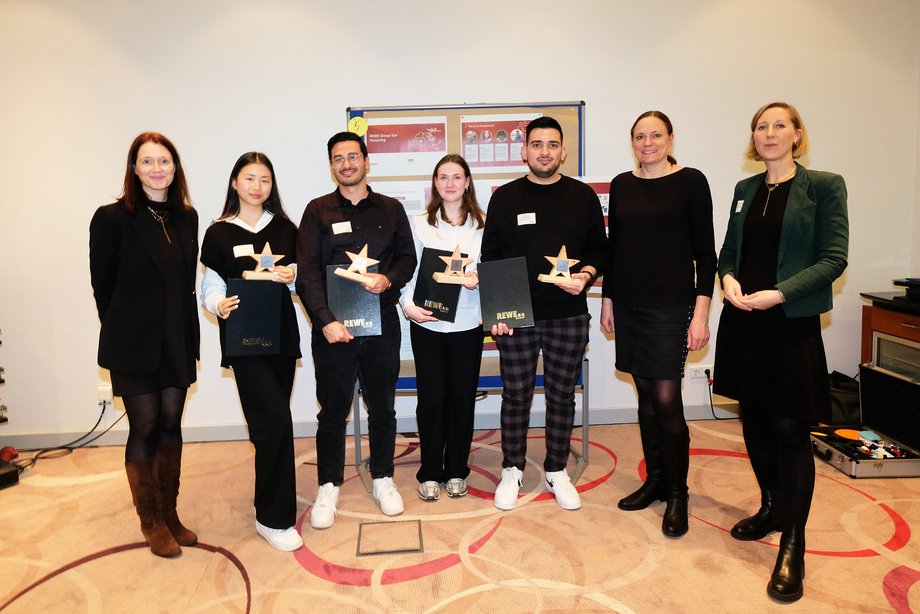 5. Place: "Puzzycling"
5. Place: "Puzzycling"
Team: Lotta Herse, Olcan Kartal, Selim Tepecik, Deborah Marienfeld, Shu-Xin Shen
Division/SGE: REWE Deutscher Supermarkt AG & co. KGaA
What was the main idea behind the project?
An enormous amount of waste is produced every day. Many people do not pay attention to proper and careful waste separation. The "Puzzycling" team, whose name already gives a small hint of the project, has set itself the task of starting right there. Thanks to the creative idea of making small puzzles from empty packaging and producing the necessary glue themselves in a resource-saving way, seven puzzles were ultimately made and donated to the "Regenbogen" kindergarten in Cologne-Ehrenfeld. The children were also given an interactive presentation on the subject of waste separation.
What was the most important thing about the project for you?
"As a food retail sector, we saw it as our responsibility to tackle the existing waste separation problem," explained Selim Tepecik, a trainee wholesale merchant. The vivid and playful creations inspired children of a young age to separate waste and raised their environmental awareness.
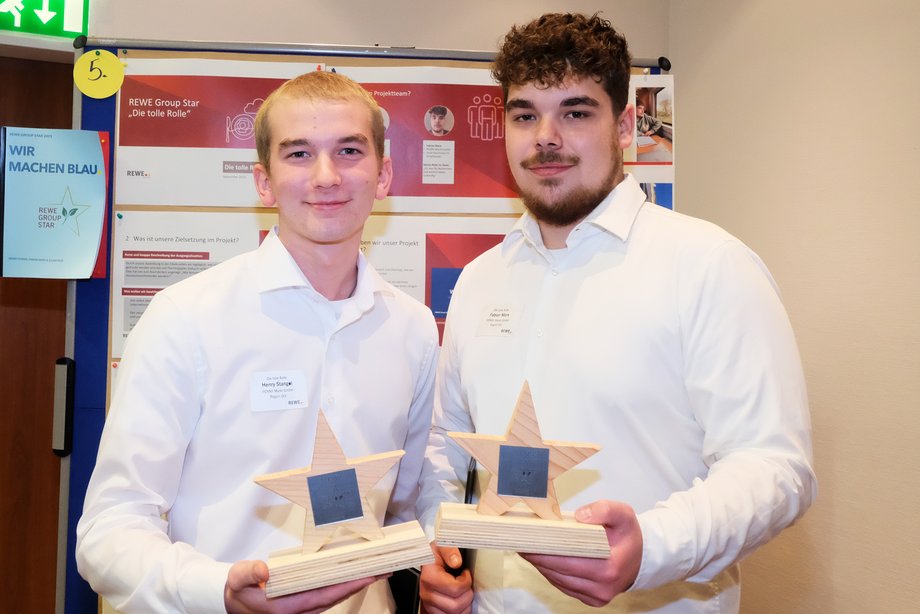 6. First place: "The great role"
6. First place: "The great role"
Team: Henry Stangel, Fabian Marx
Area/SGE: PENNY Markt Ost
What was the main idea behind the project?
"We thought about what we could improve in the daily operations of the stores. As a result, we realised that a lot of rubbish is generated by discarded receipts and we came up with the idea of starting there," reported Fabian Marx, who, like his colleague Henry Stangl, works as a trainee retail assistant at PENNY.
During their training in the shop, the two see every day how many receipts are printed and how much thermal paper is used as a result. This fact got the duo thinking, so they considered how the store could become more sustainable and resource-efficient. The idea was to create a technical report to raise awareness of the disadvantages of conventional receipts and to sensitise people to the issue of resource consumption and its environmental impact.
What was the most important aspect of the project for you?
"We wanted to inform ourselves about the topic, initiate a discussion within the company and show the people in charge how important Sustainability is to us junior employees. Accordingly, we want to encourage a rethink and do our bit to make PENNY more sustainable," summarised Henry Stangl.
The REWE Group Star
With over 200 projects submitted, more than 1,000 participants and 68 winning teams, the REWE Group Star has become an important part of the Group's internal promotion of young talent over the past eleven years. The competition is aimed at junior employees, such as trainees, who are encouraged to use their creative ideas to take an in-depth look at the topic of Sustainability and search for solutions.

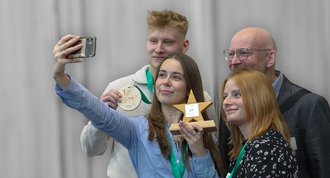
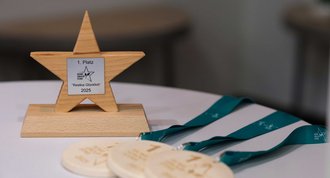
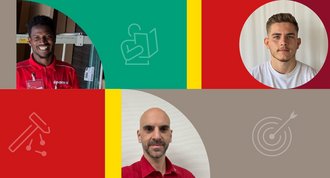
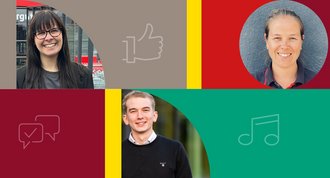
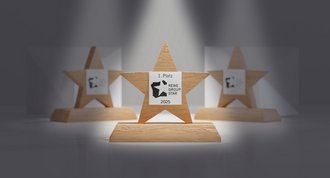
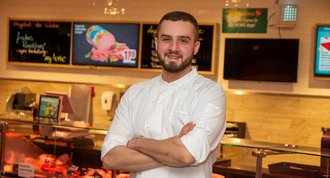
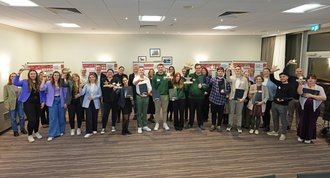
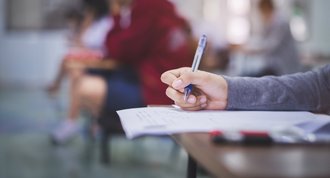

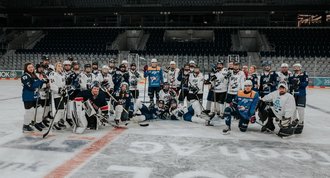
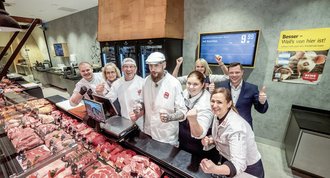
Both German and English comments appear here.
Röling is written without an h, otherwise a very nice contribution.